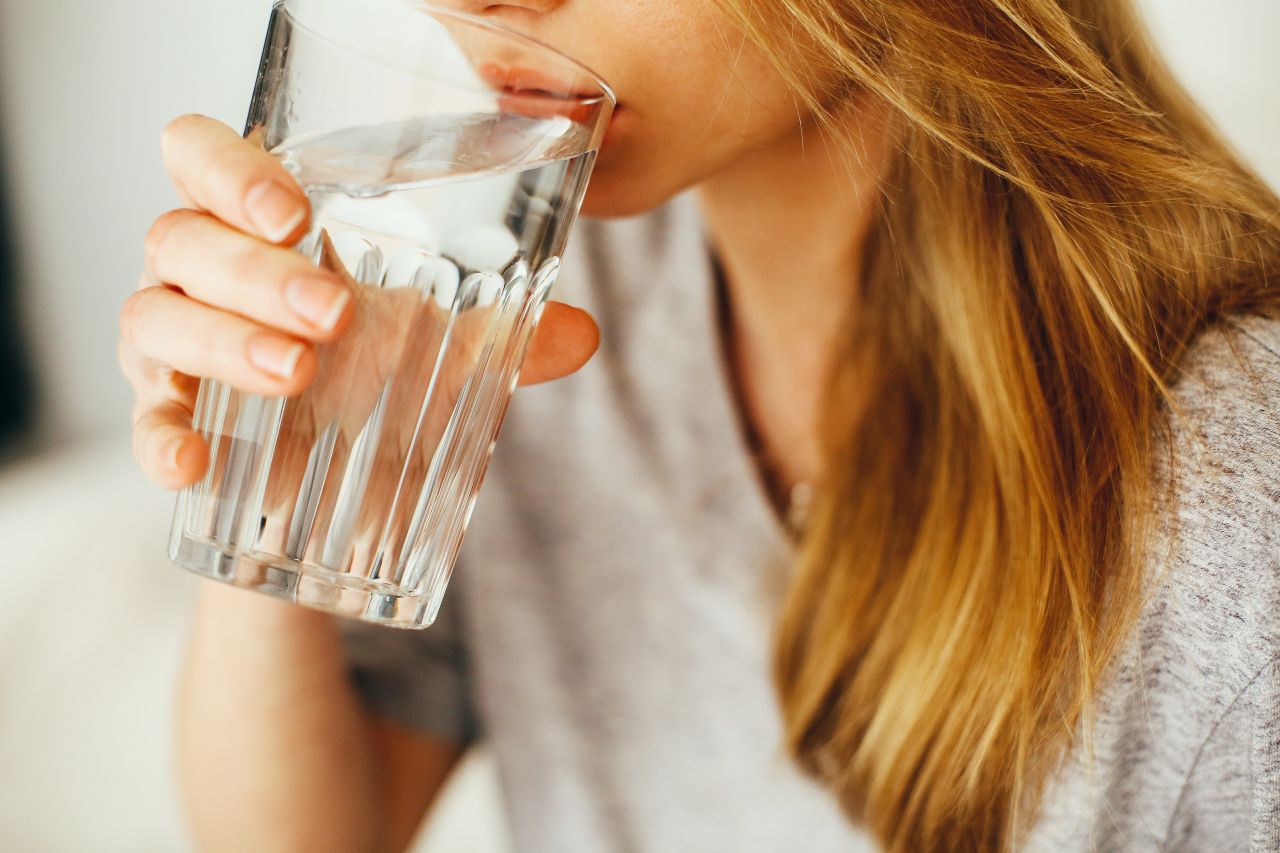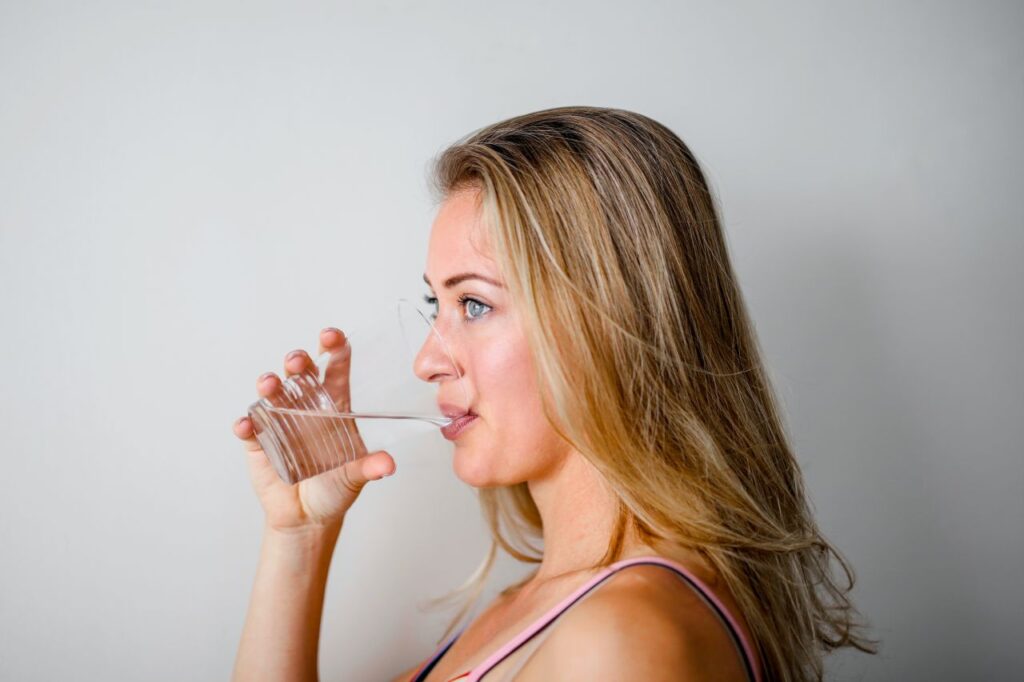In the course of a normal night's sleep, a person's body can drop as much as 1.5 lbs. If you want to see the smallest number possible when you step on the scale, it's best to do it first thing in the morning.
Fluids are lost through breathing, perspiring, and even getting up in the night to urinate. Drinking too much water, especially before night, might be problematic. There's a good chance that you'll have to get up to use the bathroom, and that can disrupt your sleep, which can have negative effects on your health.
Conditions that necessitate getting up and going to the bathroom become increasingly common as people age. Nighttime bathroom trips can be brought on by a variety of conditions and treatments, including diabetes, an overactive bladder, and even some drugs. This means that you should probably avoid drinking any more water in the three hours before night.
The Benefits of Drinking Water Before Bed

Promotes Sleep
As you wind down for the night, drink a glass to help your body maintain a healthy balance of hormones, vitamins, and minerals. Having a glass of water before bed helps the body naturally heal itself by balancing the joints and muscles. Instead of straining to get the nutrients it needs, your body may take it easy in the refreshing water. This will guarantee you a decent nights sleep of sleep.
Did you know that one third of the British population doesn't drink any water at all during the day? We need to all up our water intake to the suggested eight glasses per day. If you drink plenty of water, your body will have more energy, be better able to digest meals, and burn more fat. The next morning, we're ready to take on the day with renewed energy and enthusiasm.
Burns Calories
Cold water consumed just before bedtime has been shown to increase calorie expenditure in the body. Drinking chilled water before bedtime forces your body to make twice as much effort to warm the moisture, which increases your metabolic rate and helps you burn more calories as you sleep. While you sleep, your body burns the surplus calories it has stored because you aren't consuming any new ones.
Weight loss is only one of the many health benefits you can enjoy from drinking more water. If you increase your water consumption right before night, you'll quickly shed those excess pounds.
You can increase the number of calories your body burns as you sleep if you drink a glass of cool water before turning in. When your body works harder to heat water, it burns the additional calories you gave it the day before. In addition to a balanced diet and regular exercise, drinking lots of water will help you shed unwanted pounds.
On the whole, if you drink water right before bed, you'll wake up feeling refreshed, healthy, and physically well-rested. Drinking a drink of water may not seem like much, but it will have major, long-term effects on your health.
While we're discussing slumber, we'd also want to introduce you to our friends at Somnox. Their Somnox sleep robot helps you relax your body and mind before bed, sleep through the night, and wake up feeling refreshed. We wanted to share their stories with you because we know that leading a healthy life is essential to you, our reader.
Natural Cleanser
It goes without saying that water is an effective cleaning. Drinking a glass of water prior bed gives your body the energy it needs to flush out the day's accumulated toxins as you sleep. There will be positive effects on your digestive system, skin, and muscles. Since water makes up the majority of the human body, drinking a glass of fluid at bed will help you go to sleep feeling refreshed. In order to keep your body properly hydrated and in good health, drinking cold water just before bed is a great idea.
Overnight Detox
Water is a natural approach to assist the body detox and promote digestion, especially hot or warm water.
Warm water improves circulation, aids in waste elimination, and causes you to sweat more. Some water may be lost during the night due to perspiration, but this is a good thing because it helps flush out any extra salts or toxins while also cleansing the skin.
Having a glass of warm water in the morning will help you stay hydrated all night and may also aid your body in eliminating toxins. Stomach cramps and soreness could be alleviated as well.
Add some lime or lemon juice to the water before bed if you find plain water too boring or if you're attempting to fight off a cold. When you consume lemons, you get a healthy dose of vitamin C, which strengthens your immune function and aids in the battle against illness.
Improved Mood
Studies show that dehydration can severely affect mood, which in turn might disrupt your natural sleep-wake rhythm. Increasing one's water intake has been linked to improved feelings of happiness, contentment, and serenity. Get a countertop watercooler to have instant access to filtered, chilled water in your kitchen. Connected to your home's water supply, you'll save money and avoid adding to the global problem of single-use plastic pollution.
Water before bed can help you have a better night's sleep, which will reflect in how rested and revitalised you appear in the morning. Just don't let your memory keep you up all night. Drinking more water, however, will have a beneficial effect on your way of life. Having a glass of water before bed is a good habit since the fluids has all night to flush your system.
Preventing Hangovers
Ugh, that terrible after-drinking feeling we all know so well. After a night of partying with your pals, you wake up the next day feeling like you were run over by a truck. Alcohol increases the frequency and volume of urination, which contributes to dehydration and worsens the effects of a hangover.
It's common knowledge that consuming alcohol in moderation is the greatest method to prevent the dreaded hangover. But drinking water can help alleviate the pain of a hangover. Two glass of water before bedtime and in between alcoholic drinks are two examples.
Before leaving out for night with friends, fill up a water bottle and set it on your nightstand. If you don't want to wake up with a pounding headache the next day, make sure to hydrate when you get back.
Weight Loss
This isn't some passing craze you read about in the magazine's back pages, though. To your surprise, your body will burn calories just trying to warm up a glass of ice cold water before bed. Because of the reduced activity of a sleeping body, this process must work twice as hard.
Do not assume that this strategy will result in the same caloric expenditure as regular exercise. However, drinking a chilled glass of water before bed will help you burn calories even while you rest. Diet and exercise, however, are the simplest and healthiest ways to control one's weight.
What Is Nocturia?
Drinking water at bed may boost your desire to urinate at sleep.
Increased urination needs during the night are known as nocturia. More hormones that impair kidney function and lower urine production are produced by the human body when we sleep.
When taken together, these two elements lessen the urgency to get up and urinate during the night. In addition to disrupting your sleep's overall quality, getting up too often can cut into its total duration.
Risks of Nocturia
A major decrease in quality of life can result from nocturia because of the effects on sleep.
Sleep deprivation can have a bad impact on a person's mood, memory, and attention. Obesity, heart problems, diabetes, and depression are just some of the illnesses whose risks can rise as a result.
Getting Rid of Nocturia
Drinking water after dark is not recommended for those who suffer from nocturia. It's possible that someone could experiment by drinking their second glass a couple hours earlier than usual.
It's still crucial to get enough water in throughout the day. Reducing overall consumption is usually ineffective unless the user is drinking excessively.
However, right before night, it's best to cut back on or skip:
- Coffee, tea, cola, soda, hot chocolate, and alcoholic beverages
Alcohol and caffeine both increase the frequency with which you have to go to the bathroom. Additionally, caffeine may make it harder to nod off at bedtime.
If someone is suffering prolonged nocturia, they should consult a doctor for rule out other probable causes.
When Is the Best Time to Drink Water?

While there are benefits to drinking water before bed, doing so too close to bedtime might disrupt your circadian rhythm and perhaps have an adverse effect on your heart health.
In order to prevent dehydration and excessive water consumption at night, it is important to drink adequate water throughout the day. Dark urine is an indicator of dehydration. Your urine should range from a pale yellow to clear colour if you're getting enough fluids in your diet.
The average recommendation is eight cups of water each day, however everyone's needs are different. Whether you're pregnant, really active, or experiencing hot weather, you may benefit from increasing your water intake.
The greatest ways to maintain water intake include:
- vegetable and fruit consumption should be increased because they are high in water content.
- Water consumption recommendations include drinking water before, during, and after exercise, as well as with meals, since thirst is often misinterpreted as hunger.
Amount of Water You Need
Water intake varies from person to person, but most individuals should aim for 64 ounces daily. This is the same as eight eight-ounce glasses of water. This is nearly two litres, and you can find lots of 1-liter bottles to assist you stick to your goal.
The suggested 64-ounce amount is meant solely as a suggestion. Some people, such as athletes, pregnant women, and those who live in extremely dry locations, may require more water than the average person.
Chapped lips, a dry mouth, and black or smelly urine are all symptoms that you might not be getting enough fluids and could be dehydrated. It's recommended that you drink more water or talk to a doctor about what amount is best for you.
Water & Sleep Deprivation Correlation
Drinking too much water before bedtime can cause nocturia, which is the term for having to get up several times during the night to use the restroom. Disruptions to your sleep cycle, such as noise or light, can leave you feeling less rested than usual when you wake up.
In addition, getting up several times in one night reduces the likelihood that you will receive the recommended eight to ten hours of sleep each night. Consequences such as these may become more likely if this pattern of behaviour becomes habitual.
- Gaining too much weight and becoming overweight
- Hypertensive Disorders
- The Disease of the Heart
- High levels of cholesterol
There is no one-size-fits-all solution to the question of when to drink water. If you drink at least 64 ounces per day, the time of day may not matter as much.
What you should be on the alert for seems to be whether excessive H2O intake is disturbing your sleep. If this describes you, it may be best to limit your water intake to the morning hours and increase your intake of meals high in fluids, such as fruits and vegetables.
Although being hydrated during the day is crucial, drinking too much water right before bed can cause sleep disturbances. Avoid potable water and other fluids at two hours before resting to prevent rising up at night.
Consult your doctor or nutritionist if drinking before bedtime has made your symptoms worse. They can advise you on the optimal hydration level for you diet and health.
Conclusion
A shocking one-third of Brits don't take in any liquids at all during the day. To lose weight quickly, drink more water immediately before bed. If you drink cold water right before bed, your body will have to work harder to warm it up. Consuming a glass of chilled water just before bedtime has been shown to enhance metabolic rate during sleep. The sleep robot from Somnox aids in winding down before bed, getting a good night's sleep, and waking up feeling revitalised.
Weight loss is facilitated by drinking water. A person's natural sleep-wake cycle might be thrown off by the negative emotional effects of dehydration, according to research. Drinking alcohol causes you to urinate more frequently and in greater volume, which can lead to dehydration and exacerbate the symptoms of a hangover. If you drink water before bed, you'll continue to burn fat as you sleep. If you have nocturia, you shouldn't be drinking water after dark.
Too many interruptions during sleep can shorten its duration. Dehydration is indicated by dark urine, thus drinking plenty of water is crucial. The typical daily water intake guideline is eight glasses. If you have dry lips, a dry tongue, and dark or odorous urine, you may not be drinking enough water. Having to get up multiple times during the night to use the potty is called nocturia, and it can be brought on by drinking too much water before bed.
Content Summary
- Overhydrating, especially right before bed, might cause problems.
- A glass of water right before bedtime can aid in the body's natural healing process by restoring muscular and joint equilibrium.
- Drinking a glass of cool water just before bedtime will increase the number of calories your body burns while you sleep.
- The Somnox sleep robot is designed to help you wind down physically and mentally before bed, get a good night's rest, and feel revitalised in the morning.
- If you have a glass of water right before bed, your body will have the energy it needs to eliminate the toxins it has gathered throughout the day.
- It's a good idea to drink some water before bed so that it can help flush your system as you sleep.
- It may help to drink water to ease the discomfort of a hangover.
- It may come as a surprise, but drinking a glass of ice cold water before bed will actually cause your body to burn calories as it attempts to bring the temperature up to a more comfortable level.
- But if you have a glass of cold water before bed, you can continue to burn calories as you sleep.
- Nocturia refers to the need to urinate frequently throughout the night.
- It's crucial to drink enough water throughout the day to avoid being dehydrated and then drinking too much water at night.
- If you regularly consume 64 ounces of water, it may make less of a difference when time of day you drink.
- If you find that consuming alcohol right before bed makes your symptoms worse, you may want to talk to a doctor or nutritionist.
FAQs About Drinking Water
Cleanses your body. Staying hydrated throughout the day and evening can help with breaking down waste in your body and releasing toxins through sweat.
Helps regulate your body temperature. If you're in an extra warm environment or feeling especially hot, cooling your body down with a bit of water can be beneficial before bed. Try sucking on ice cubes or taking tiny sips of water before bed.
If you drink too much water before bed, it may actually make losing weight harder. Some water before bed helps your body stay hydrated at night. However, too much water before bed can interrupt your sleep cycle and lead to a chronic lack of sleep. That, in turn, can increase your risk of obesity and hinder weight loss. Low drinkers of water will want to up their intake during the day instead. That can help you both lose weight and go to bed healthy and hydrated without drinking too much water at night.
Your body loses water throughout the day, and when you lose water, you need to replace it. However, increasing your fluid intake right before bed will proportionately increase your urine output as well. Therefore, too much water before bed can make you sleep-deprived if it leads to night after night of multiple trips to the bathroom. Too many trips to the bathroom can lead to disrupted sleep patterns and eventually chronic sleep deprivation. That means you should drink water normally up to an hour or two before bed. But you should consider decreasing your fluid intake before sleep to avoid having to use the bathroom all night.
Getting enough water every day is important for your health. Drinking water can prevent dehydration, a condition that can cause unclear thinking, result in mood change, cause your body to overheat, and lead to constipation and kidney stones.
Water keeps every system in the body functioning properly. The Harvard Medical School Special Health Report 6-Week Plan for Health Eating notes that water has many important jobs, such as: carrying nutrients and oxygen to your cells. flushing bacteria from your bladder.





